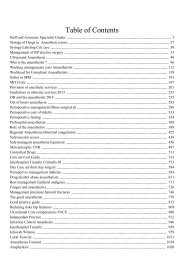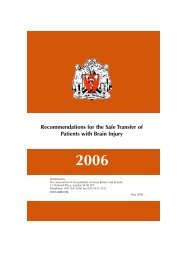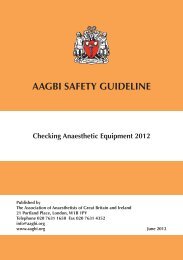TheatrePracticeStandardsGeneric1
Create successful ePaper yourself
Turn your PDF publications into a flip-book with our unique Google optimized e-Paper software.
Generic Theatre Standard No 06A - Management of Patients with Known<br />
Clostridium difficile and GDH in the Operating Department<br />
Standard Statement: All Theatre staff will have knowledge of the requirements for caring for<br />
patients with Clostridium difficile in the operating department to protect self, colleagues and<br />
patients from the risk of health care acquired infection.<br />
The bacterium produces two potent toxins that cause mucosal damage and inflammation of the<br />
large bowel. Although in most cases it causes a relatively mild illness, occasionally, particularly<br />
elderly patients may develop a severe form of the disease called ‘pseudomembranous colitis’. This<br />
condition is characterised by significant damage to the large bowel, and may lead to gross dilation<br />
with possible rupture or perforation of the bowel.<br />
C.difficile infection is often acquired in hospital, and almost all patients who develop C.difficile<br />
diarrhoea are taking, or have recently been given antibiotic therapy. Nearly all antibiotics have<br />
been causally associated with C.difficile however, some such as cephalosporins, (particularly oral<br />
cephalosporins) and antibiotic combinations such as cefuroxime and clarithromycin are more<br />
strongly associated whereas gentamicin, vancomycin, and trimethoprim are much less often<br />
associated.<br />
It has been firmly established that person to person transmission can occur in the hospital setting<br />
and indeed major outbreaks have resulted. Staff hands are the most important mode of<br />
transmission, but studies have also demonstrated that C.difficile, as a spore forming organism, can<br />
survive for long periods of time in the environment and on contaminated equipment.<br />
The sensible use of antibiotics is the key to the prevention of C.difficile infection. Unnecessary use<br />
of antibiotics must be avoided. Where possible, short courses of narrow-spectrum antibiotics, of<br />
only three to five days, are preferred to longer courses. All antibiotic prescriptions should be kept<br />
under review.<br />
Trust antimicrobial prescribing guidance must be followed. Antimicrobial prescribing audits will be<br />
conducted regularly.<br />
General Considerations<br />
RCHT C.Diff Prevention and management of Clostridium difficile infection policy<br />
RCHT Generic Theatre Standards 4: Infection Control in the Operating Theatre<br />
• Staff very rarely suffer from symptoms related to C.difficile. However, should staff be<br />
receiving antibiotics then they may be at some risk of infection, and therefore should<br />
avoid contact with known cases of C.difficile infection.<br />
• Position on list Symptom free in last 72 hours: DO NOT NEED to be last on list.<br />
Symptoms present in last 72 hour: Consider either allowing sufficient time between<br />
patients to allow staff to robustly clean, without pressure, using Actichlor Plus AND<br />
recover OR placing patient LAST ON LIST<br />
• Hand Hygiene Staff hands are the most important mode of transmission from patient<br />
to patient. Soap and water must be used for hand hygiene rather than alcohol rub -<br />
soap and water is far more effective. Decontaminate hands following Ayliffe’s seven<br />
step technique (RCHT ANTT Policy). Patients must also be encouraged to wash their<br />
hands. If the patient is bed bound, patient wet wipes should be offered for hand<br />
hygiene as an alternative to soap and water.<br />
28





